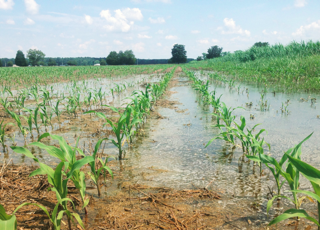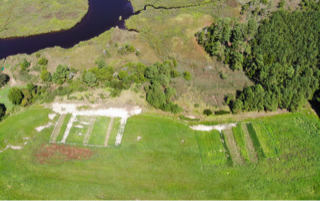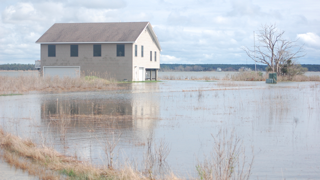Knauss legislative fellowships in Congress help build careers — and they're fun and educational. See our video and fact sheet for details.
Coastal Farming Challenges: Flooding, Salt, and Land Loss

In this study, Maryland Sea Grant and partners sought to understand the challenges coastal farmers and woodlot owners in Maryland and Virginia face because of increased flooding and salty soils. The results of this study will be used to help inform what research, training, or resources would be most helpful to the agricultural community in the future. Participants had the opportunity to speak directly to decision-makers about their concerns and try to build solutions.

Background and Findings
Farmers and woodlot owners in Maryland and Virginia are facing increased challenges as coastal flooding and salty soils are negatively impacting their land. Adapting to these challenges may require different strategies to manage land under saltier or wetter conditions. This project aimed to better understand the factors that are most important to farmers and woodlot owners as they make decisions concerning ongoing management of their farm and/or woodlots in the face of increased flooding and saltier water. We learned about sea level rise impacts seen on study participants' lands, their challenges to current management strategies to resist or adapt to environmental changes, and their top ranked suggestions to address policy and research gaps. Full findings are available in our article “Resisting-accepting-directing sea level rise on the Chesapeake Bay: Agricultural producers’ motivations and actions” in the Journal of Environmental Management or view our summarized findings here.

Workshop 1: Getting on the same page—where do you see land changes?
Agenda
Presentation:
Causes and effects of saltwater intrusion on Maryland’s Lower Eastern Shore
Workshop 2: Your view—what works and what doesn’t?
Agenda
Presentations:
Friend or foe? Phragmites and other wetland plants in the coastal slosh zone
See slides here: CBSSC workshop Phrag friend or foe.pdf
Drainage Practices on Coastal Agricultural Lands
Assessing and Remediating for Salty Soils
Conservation Easement Opportunities through Natural Resources Conservation Service
Workshop 3: Connecting the dots—your needs and available information.
Agenda
This free workshop is made possible through the National Science Foundation’s Coastlines and People grant #ICER-1940218

The Chesapeake Bay Sentinel Site Collaborative is a group of scientists, coastal managers, decision makers, and community liaisons across Maryland and Virginia focused on applying sea level rise science to stakeholder decision making.
For more information, please contact:

Coordinator for the Chesapeake Bay Sentinel Site Cooperative
Phone: (301) 405-6378
Email: sudol@mdsg.umd.edu



